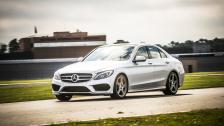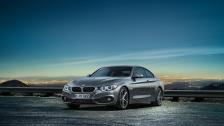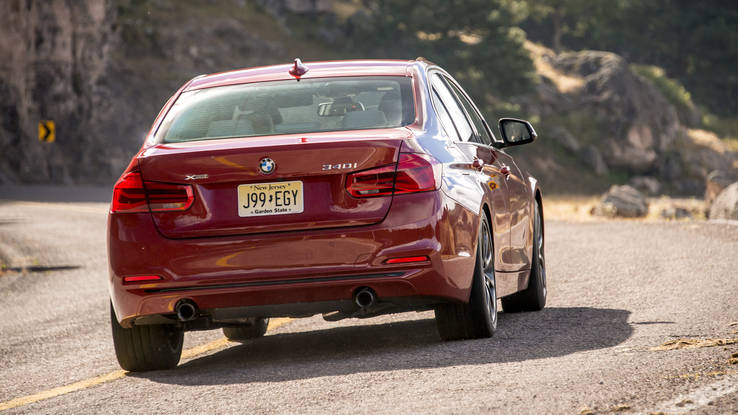
Even BMW’s 3-Series needs an update from time to time, capable as it is, and for the 2016 model year the automaker’s best-sized model has received a midcycle facelift. More than that, the range has gained a new engine that takes over as the top powerplant in the lineup … not counting the M3 land rocket, of course.
It’s called the 340i and it’s here to rock the non-M Division 3-Series world in an efficient and very German way.
Let’s back up a little, though: The sixth-generation 3-Series has been on sale since 2012, and until now the range has been led by the 335i, powered by a turbocharged 3.0-liter inline-six producing 300 hp and 300 lb-ft of torque. That model is kaput for 2016 and it is replaced by the 340i which, despite the big numbers on the badge, is still a turbocharged 3.0-liter inline-six.
But it’s an entirely new all-aluminum engine, part of the automaker’s EfficientDynamics family of powerplants. And with the help of the TwinPower twin-scroll turbo, it churns out 320 hp, available between 5,500 and 6,500 rpm, and 330 lb-ft of torque, on tap from just 1,380 rpm. Coupled with an eight-speed Steptronic automatic transmission, this new engine sends the rear-wheel drive version of the sedan past the 60 mph mark in just 4.8 seconds; the xDrive all-wheel-drive version is quicker still, with a 4.6-second sprint time — impressive figures for a model that doesn’t have the letter M in front of its name.
The 340i still packs a 3.0-liter six-cylinder engine with a twin scroll turbo, but it’s an entirely new unit. Yeah, it’s not the same as what we had in the 740i a generation ago — don’t mind those old V8s.
Don’t worry — BMW hasn’t done away with the six-speed manual. In fact, it’s a no-cost option on most of the range, and that’s true for both rear-wheel-drive and all-wheel-drive versions of the 340i.
The new engine and the new badge are almost enough to distract from the more superficial changes in the 3-Series. BMW has adjusted the front and rear fascias, resculpting the headlights and giving the sedan a more aggressive front spoiler. The LED headlights (standard on the 340i) have been moved closer to the edges of the front fascia to give the 3-Series a visually wider stance. The changes out back are more subtle, though the look of the taillights is more cohesive despite BMW sticking to the “mismatched” trunklid theme. Overall, the changes in sheetmetal are evolutionary and have been carefully crafted to avoid making the pre-facelift model look dated.
The outgoing version of the sixth-gen 3-Series took some heat for offering a softer experience aimed at the general luxury car buying public, versus those who want a more traditional German sports sedan. This midcycle update, then, is best viewed as a counterpoint to the notion that the latest generation of the 3-Series has lost its edge, or become too plush in the way that the Mercedes-Benz C-Class strives to offer a pocket-sized S-Class experience instead of a standalone compact sports sedan.
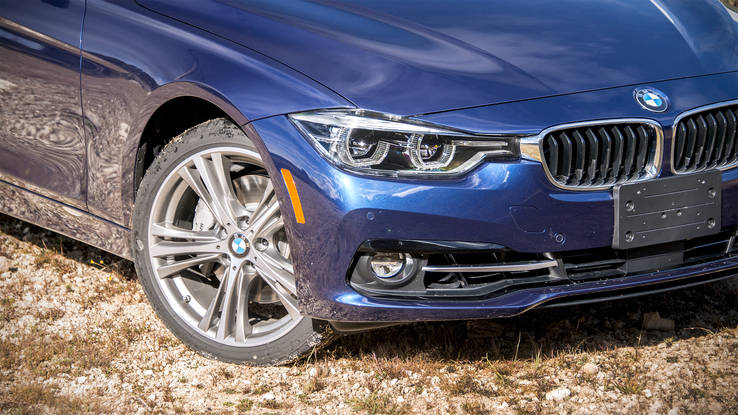
BMW has reworked the front fascia, moving the headlights further to the edges to give the car a wider appearance. LEDs are standard on the 340i and optional on much of the rest of the model range.
BMW has also reworked the suspension setup, altering the power steering settings and changing the geometry of the chassis itself with a new front strut design and new rear dampers. The result is claimed to be an improvement in directional stabillity and decreased body roll — that goes for cars with the standard suspension, as well as those optioned with the M Sport suspension and the Adaptive M suspension, with the latter offering electronically controlled dampers that can be set with the press of a button.
As if the 340i was not close enough to the M3 without actually being the M3, BMW also unveiled the Track Handling pack for the whole range of gasoline-engined 3-Series models — this includes the wagons — serving up M Sport Brakes, the Adaptive M suspension and variable sport steering.
2015 Mercedes-Benz C400 4Matic Sedan review notes
ASSOCIATE EDITOR GRAHAM KOZAK: Until the automaker introduces something smaller and cheaper in the United States, the CLA is always going to be seen as an entry-level Benz — attainable luxury and all …

The 340i feels comfortable in third gear all the way up to 80 mph, which is useful when tacking corrners.
What’s it like to drive?
We visited Mexico’s Copper Canyon region in Chihuahua state to pilot the 340i and the new BMW X1 on some of the twistiest and least traveled roads in the country … least traveled by other cars, that is. There were plenty of video game-like challenges to maneuver around, including burros, bull calves and scattered rocks.
With 320 hp on tap, acceleration is effortless; one of the car’s most impressive features is the depth of the power band between 50 mph and 80 mph. That’s where 3-Series sedans of yesteryear have had to puff themselves up and let out a good wail to quicken the pace. That gap is demolished with no drama whatsoever with this new six-cylinder. All it takes is a gentle prod from the right foot, and the speedo starts displaying serious figures with the exhaust barely raising ts voice.
At high speeds, the steering strikes a good balance between communication and comfort, still allowing the texture of the road to reach the fingertips without transfering any of the harsh impacts into the dash or the palms. There’s just enough road noise permitted into the cabin to keep occupants involved, with BMW declining to completely shut out the outside world.
2015 BMW 428i xDrive Coupe review notes
ASSOCIATE EDITOR GRAHAM KOZAK: Previous experience with current BMW 3-series and 4-series cars tells me that the 428i xDrive gets more fun the more you try to do with it, but frozen roads and traffic …
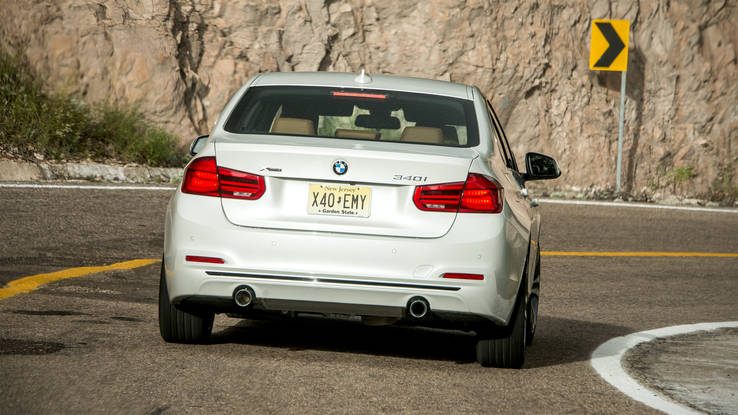
The 340i feels more at home at higher speeds, the same way a modern muscle car dislikes 25 mph speed limits.
The 340i feels most at home at speeds just below 100 mph — at this pace the sedan is most relaxed, like a boxer dancing around an adversary who’s already halfway to being knocked out. The car can still throw a punch at that speed, getting up past 100 mph without much extra effort, all while maintaining the same handling characteristics as at 60 mph or thereabouts.
But any BMW can cruise at triple-digit speeds. The corners are what the 3-Series lives for. And here it once again manages to impress with taut body control, confident steering that lets the driver know just how close to the edge he’s getting, and brakes that feel consistent and durable. Even when decelerating from high speed, the car barely dips its nose as we scrub 40 mph worth of velocity in just a couple of seconds — it’s ready to switch into hairpin-tackling mode at a moment’s notice. The 340i can stay in third gear up to 80 mph, and we found that we didn’t really need fourth gear when tackling the twisty canyon roads.
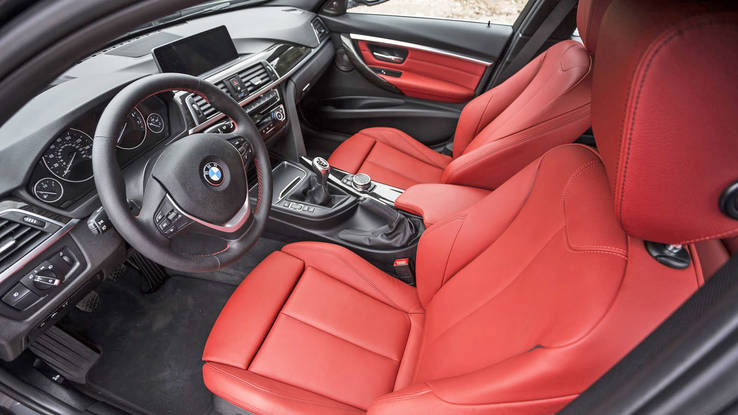
The tweaks to the interior are a little more subtle and don’t present any visual surprises.
Do I want it?
Lest you think that the 3-Series has become lost among an ever-increasing range of cars from Munich (“Is that the one that’s like a sedan but with a fastback roof and a hatch?”) you’ll be pleased to learn that the 3-Series still accounts for 25 percent of all BMWs sold. And thankfully, BMW hasn’t forgotten where its bread is buttered with this refresh.
The BMW 340i has been designed by labcoat-wearing German engineers to be the most 3-Series money can buy without going for the M3. It’s a beefier version of the outgoing 335i, and with a choice of rear-wheel drive and all-wheel drive, and with a no-cost manual transmission available, the 340i makes a great case for itself even on paper.
The question isn’t whether you want it, it’s which color you want.
